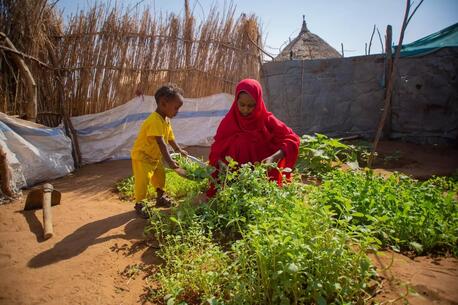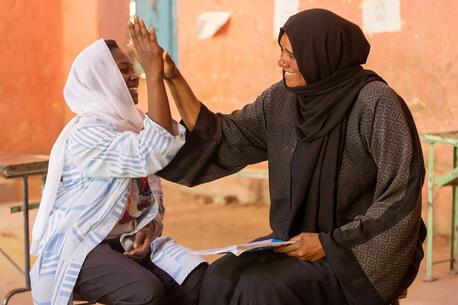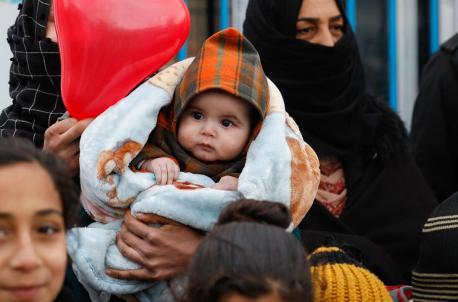
War in Syria: Children Still Suffering Profound Impacts
UNICEF's humanitarian response inside Syria — and in five neighboring nations hosting some 5.7 million refugees from the country — reflects the deep and devastating effects on children and families from over a decade of violence and rights violations.
March 15, 2022, marks 11 years since Syria erupted into civil war, bringing death, destruction and mass displacement, and plunging the country into a complex, multi-layered crisis that continues to threaten children's rights and futures.
The horrors unfolding in Ukraine today echo what was happening in Syria a decade ago, as millions of people were forced to flee their homes and across borders seeking refuge and relief from violence, extreme hardship and devastating loss.
Nearly 5.7 million registered refugees from Syria, including almost 2.7 million children, currently live in Egypt, Iraq, Jordan, Lebanon and Turkey.
Impacts of Syria's prolonged conflict compounded by the COVID-19 pandemic
In its 2022 humanitarian action plan for Syria, UNICEF recognizes the profound impacts on children and families of Syria's prolonged conflict — impacts compounded by the COVID-19 pandemic — and lays out its strategy for reaching 5.9 million children in need with critical support including access to safe water, health care, nutrition, education and protection.
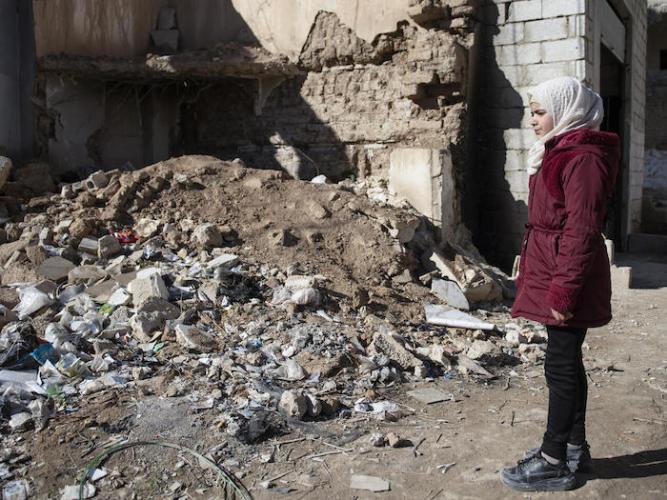
Aminah, 11, at the spot where her family once lived in their hometown of Almleha, rural Damascus. Aminah's father and eldest brother were both killed and another brother badly injured when a shell hit the bakery where they worked. Aminah is receiving psychosocial support services through a UNICEF program to help deal with her trauma. "[My case manager] Ms. Areej taught me how to look at things differently and how important it is to be present rather than to live in painful memories from the past,” Aminah says. Read Aminah's story. © UNICEF/UN0603133/Belal
Together with partners, UNICEF works to assist those in need wherever they are, whether that's inside Syria or a neighboring country, at a camp or an informal settlement, at a remote, small town or urban setting. UNICEF also supports children in refugee host communities through a range of programs.
By many measures, the fallout from Syria's war is staggering. Every Syrian child has been impacted by the violence, displacement, severed family ties and lack of access to vital services caused by massive physical devastation.
A closer look at the situation in Syria, one of the world's worst humanitarian crises perpetuated by war
Nearly 5 million children born in Syria since March 2011 have known nothing but war and conflict, and in many parts of the country, children and families continue to live in fear of violence.
The crisis continues to leave Syrian children with psychological scars. One-third of children in Syria showed signs of psychological distress including anxiety, sadness, fatigue, or trouble sleeping in a 2021 assessment.
Nearly 13,000 children have been killed or injured since the start of Syria's civil war
Nearly 13,000 children have been killed or injured since the start of the war in Syria. One-third of all recorded injuries and deaths are caused by encounters with landmines and other remnants of war. Just this past weekend, three children were reportedly killed by unexploded ordnance in Aleppo city.
Those who survive such encounters are left with lifelong disabilities. And children with disabilities carry a double burden when it comes to violence, threats to their health and safety, hunger, risk of abuse and loss of education.
The hardships their families face, and that most families face in Syria today — limited employment opportunities, skyrocketing prices, unprecedented levels of poverty, severe shortages of basic goods and services — makes getting children with disabilities the care they need difficult. Lack of mobility and difficulty fleeing from harm further compound their obstacles.
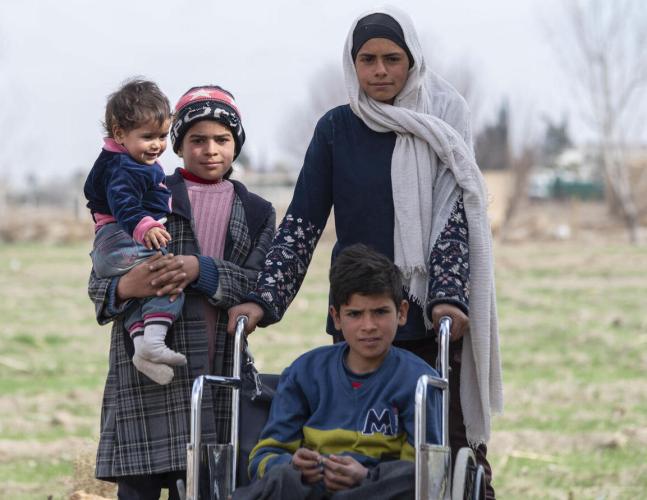
Azzam, 12, front center, gravely injured during the war at age 5, is surrounded by his sisters Sidra, 14, Nour, 11, and Khadijeh, 1, outside their home in Nashabieh, East Ghouta, rural Damascus. Azzam attends a school that UNICEF helped rehabilitate and equip for inclusive education. Read Azzam's story. © UNICEF/UN0603137
“Like all children, children with disabilities have the right to be cared for and nurtured. UNICEF remains committed to support these children, without stigma and wherever they are in the country,” said UNICEF Syria Representative Bo Viktor Nylund.
A humanitarian response focused on protecting Syria's children and helping them cope
UNICEF's ongoing response in and around Syria focuses on working with partners to protect children and to deliver lifesaving support and services for those struggling physically and psychologically.
In 2021, UNICEF reached 11.3 million people, including 7.3 million children, with humanitarian assistance across Syria.
“I’m glad I can go to school again, have fun with my friends, and learn,” said 12-year-old Azzam, who was badly injured at age 5 when a building he was in was hit by a shell. His father was also injured. Both survived. After missing school for years, Azzam has resumed his education, attending a school that UNICEF supports to help promote inclusive learning for children with disabilities.
Azzam is also part of UNICEF’s integrated social protection program, which supports him and his family through regular cash assistance coupled with one-on-one support from a case manager. The integrated program provides vulnerable families an opportunity to pay for the basic needs of their children with disabilities and it connects children with critical essential services.
“We have a long road to go to help more children with disabilities and other children impacted by the war," Nylund said, "so they can reach their full potential and grow up protected from harm, healthy and educated."
In 2021, UNICEF and partners provided nearly 221,000 children with mental health and psychosocial support services through Child-Friendly Spaces and mobile teams. Explosive ordnance risk education programs reached more than 874,400 children and 176,300 caregivers.
Other components of UNICEF's ongoing response in Syria — as well as in countries hosting Syrian refugee children and families — include:
- delivering winter gear and other supplies to those with little protection against freezing temperatures and heavy rains, i.e. displaced Syrian children and families sheltering in makeshift tents or damaged or abandoned buildings with little or no heat
- in water and sanitation, providing host communities and newly displaced people in camps and shelters with access to clean and safe water through emergency water trucking; enhancing maintenance of latrines and water points; distributing essential hygiene supplies connecting camps to nearby sewage networks
- in health, distributing medicine and other critical supplies to help fight COVID-19 and other infectious diseases and supporting mobile health and nutrition units
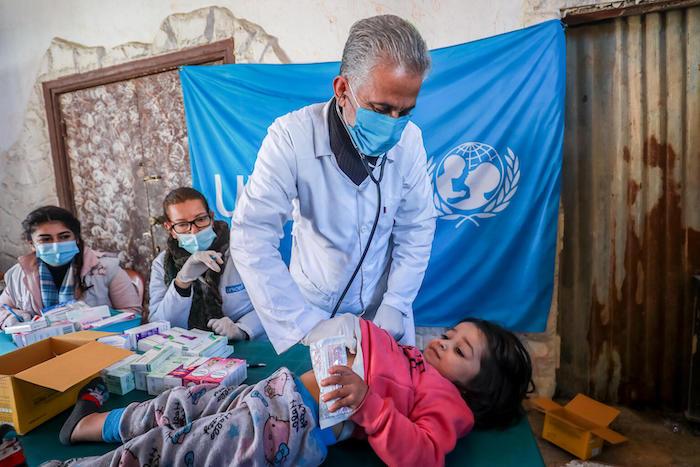
A doctor and member of a UNICEF-supported mobile health and nutrition team examines a child at a shelter for displaced families in Hasakah, northeast Syria, on Jan 28, 2022. © UNICEF/UN0585591
- in education, supporting accelerated learning and "Curriculum B" catch-up classes for out-of-school children; rehabilitating damaged schools and helping them reopen to students; and providing skills building, vocational education and training — including courses in computer literacy, accounting and nursing, among other subjects — to older teens and young adults who were forced to leave school to go to work
Countries in the Middle East that have been hosting Syrian refugees — for several years in many cases —are struggling to cover essential services for the most vulnerable, as their public resources and infrastructure are stretched increasingly thin.
As the COVID-19 pandemic has devastated livelihoods, health and access to services, needs have intensified all around, but particularly among Syrians who face additional challenges due to their legal status. This has widened inequalities, weakened social cohesion and increased health and protection risks for already vulnerable refugee children and families.
Help Syria's children. Support UNICEF's humanitarian mission in and around Syria to save and protect the most vulnerable children and families who continue to suffer the effects of over a decade of violence and civil war. Donate today.
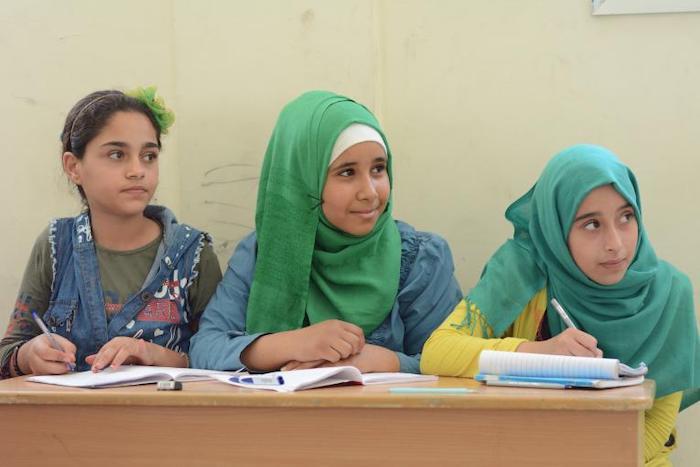
Safa, left, Majida, center, and Nour of Syria attend Level 2 Curriculum B summer classes at Escandarona school, in the Albayada neighborhood of Homs, central Syria. The UNICEF-supported program helps students who missed school due to displacement and other war-related disruptions get back to learning. Learn more. © UNICEF/Syria/2021/Abdulaziz Aldroubi
Top photo: A woman holds a child in the courtyard of Waleed Nofal school, a temporary shelter for displaced families in Hasakah city, northeast Syria, on Jan. 27, 2022. Some 45,000 people were forced to flee their homes early this year as violence erupted in and around the Ghwayran/Sinai’i detention center, and affected children continue to be critically vulnerable and in urgent need of protection. Many of the 650 families sheltering at the Waleed Nofal school have been displaced several times by violence in other parts of Syria over the years. UNICEF’s volunteers have helped people reach shelters and clinics and distributed food, blankets, mattresses, clothes and medicine. They have also provided information about the risks of explosive ordnance to raise awareness among boys and girls in the shelters and keep them safe. A UNICEF-supported mobile health and nutrition team provides health screenings, medicine and Ready-to-Use Therapeutic Food to malnourished children. © UNICEF/UN0583331

